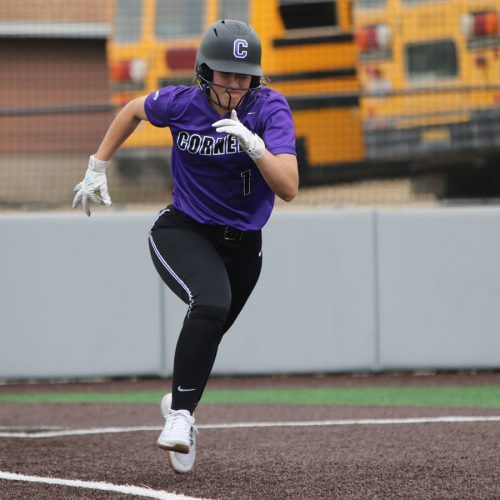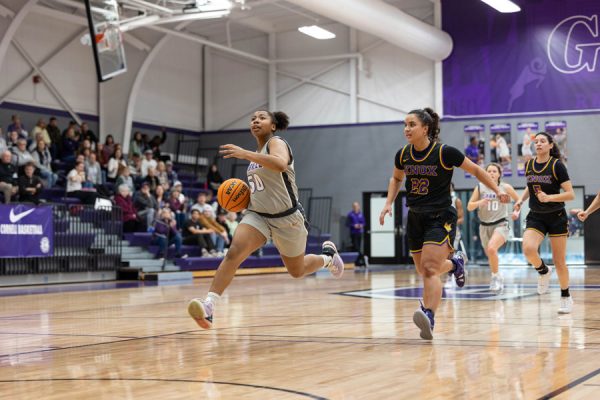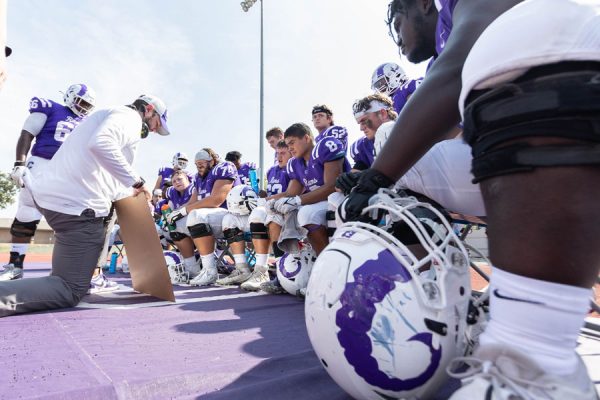Rams master the mind game
Imagine this–two outs, the bases are loaded, and the count is full.





All eyes are on you, the star pitcher. If you throw a strike in this final inning, your team wins. If you don’t—your team loses the game and the chance at a championship run.
Can you handle the pressure?
Or does anxiety get the best of you?
These are the moments Cornell coaches work on preparing their student-athletes to handle.
“Mental performance training is all about how you think and how you train your brain to think during these critical or high-pressure moments,” said Assistant Director of Athletics and Head Softball Coach Jackie Sernek Yoder ’14.
Cornell coaches are providing teams with opportunities to work with sports psychologists from an outside consulting firm. They’re discussing topics like tackling performance anxiety, keeping a positive mindset, dealing with stress, becoming a team leader, and understanding team dynamics, while also learning techniques for overcoming struggles related to these issues.
“We realized it was a lot for the coach to handle the mental performance training aspect, especially after COVID when we noticed a lot more anxiety about communication and interpersonal dynamics,” Yoder said. “It was good to have someone else our student-athletes could talk to—who is not included in the team—to give them more outside perspective and help them process their feelings and emotions.”
The mental game
The big wins come when students have exercised their brains.
Coaches don’t hesitate to say that the mental aspect trumps the physical every time.
How much of the game is mental?
It’s 80% mental and 20% physical, said both Curt Lamb, head sports performance coach, and Meredith Meier, head women’s lacrosse coach. Head football coach Dan Pifer rates it 90% mental and 10% physical.
“We really are working with them about what is going on inside their head, what they are saying to themselves,” Meier said.
Having the mental capacity to cope with last-minute changes, mistakes, and bad calls is vital to team success.
“No matter what, you have to be ready for the next play,” Lamb said. “You go on the field and everyone is going to be physically ready, because they are supposed to be. In the end it’s all about who has the right mindset, who has the best game plan, and who feels the most confident going into it. That’s the team that usually has the best outcome.”
Coaches say that players, however, have to understand they can’t control every piece of the competition, like the bad calls.
“If you allow a call you disagree with to affect your emotions, it’s also going to affect your gameplay,” Yoder said.
Navy SEALs build mental toughness
During the spring of 2023, the Rams football team welcomed three members of the U.S. Navy SEALs to campus for two long days of drills, focusing on their mental performance game.
With a young football team, Pifer wanted to build more team leaders.
“The best teams are player-led teams, not coach-led teams,” Pifer said.
The SEALs focused on leadership and teamwork, asking the athletes to conduct drills and talk about what they learned.
“Football is the ultimate team sport because we have 11 guys all doing different things, 11 different job responsibilities, and if one guy doesn’t do his job, the whole thing can just fall apart. The SEALs conducted a lot of activities on teamwork, communication, and listening.”
Pifer says during the training, the SEALs often presented the team’s next task, and he could see it in his players’ eyes—they didn’t think they could get it done. But when they broke it down and did one piece at a time, they tackled every goal. They found their mental toughness.
Together the team wrote a “Law of The Mob” that they signed and posted on the wall to remember their new team goals. It reads, in part:
We expect to fail, but we will always come back harder. We expect discipline, but we will listen with intent to get better. We must be coachable as players and men. Listen to teammates’ and coaches’ input and double the output. Give your two cents and make it a dollar.
I will give everything I have on and off the field every day, no matter the circumstances. Our strength relies on the weakest link. Sometimes high, sometimes low, always ready to roll.
“We do whatever we can to keep building camaraderie and communication and to keep the mental game going. It’s like having a family of 100 people. It’s fun but then it can get frustrating when it’s not going your way,” Pifer said.
A winning approach
With new skills to overcome mental barriers, Rams are more confident.
Now, think back to the beginning where all eyes are on that star pitcher. They throw that final pitch. And with the release of the ball—Strike.
Rams win.



